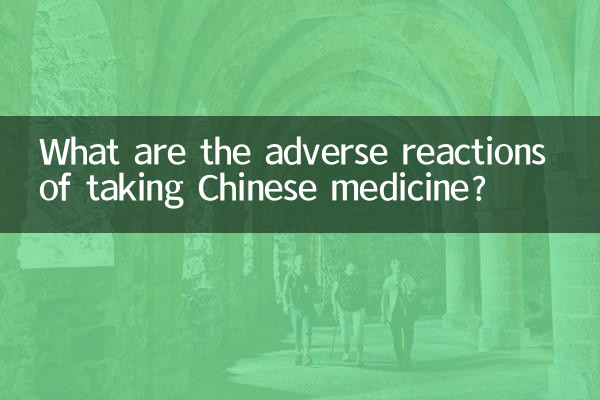What are the adverse reactions of taking Chinese medicine?
In recent years, traditional Chinese medicine has played an important role in disease prevention and treatment, but it has also been accompanied by reports of some adverse reactions. This article will combine the hot topics and hot content on the Internet in the past 10 days to discuss the possible adverse reactions caused by traditional Chinese medicine and provide structured data for reference.
1. Common types of adverse reactions to traditional Chinese medicines

Adverse reactions to traditional Chinese medicines manifest themselves in various forms, mainly including the following categories:
| Type of adverse reaction | Specific performance | Common Chinese medicines |
|---|---|---|
| gastrointestinal reactions | Nausea, vomiting, diarrhea, abdominal pain | Rhubarb, coptis, sophora flavescens |
| allergic reaction | Rash, itching, difficulty breathing | Salvia, safflower, centipede |
| Liver and kidney damage | Elevated transaminase, abnormal urine protein | Polygonum multiflorum, Tripterygium wilfordii, Aristolochia |
| nervous system response | Dizziness, headache, insomnia | Gastrodia elata, cinnabar, realgar |
2. Analysis of causes of adverse reactions of traditional Chinese medicines
The occurrence of adverse reactions of traditional Chinese medicine is related to many factors. The following are the main reasons mentioned in popular discussions in the past 10 days:
| Cause classification | Specific instructions | Typical cases |
|---|---|---|
| drug autotoxicity | Some Chinese medicines contain naturally toxic ingredients | Aconitum traditional Chinese medicine causes arrhythmia |
| Improper medication | Excessive dosage, long-term use or incompatibility | Long-term use of Polygonum multiflorum causes liver damage |
| individual differences | Patients with special constitution or allergies | People allergic to pollen develop allergies after taking chrysanthemum |
| Medicinal material quality issues | Pesticide residues, heavy metals exceeding standards, etc. | Some Chinese medicinal materials contain excessive amounts of lead |
3. How to prevent adverse reactions of traditional Chinese medicines
According to recent expert advice and popular discussions, the following measures can be taken to prevent adverse reactions of traditional Chinese medicines:
1.Take medication as directed by your doctor: Use Chinese medicine under the guidance of professional Chinese medicine practitioners and do not increase or decrease the dosage or change the medication method on your own.
2.Understand your own physique: Before taking medicine, you should understand your allergic history and physical characteristics, and avoid using traditional Chinese medicine that may cause adverse reactions.
3.Pay attention to drug compatibility: Caution is required when combining Chinese and Western medicines, as some combinations may increase the risk of adverse reactions.
4.Choose formal channels: Purchase quality-assured Chinese herbal medicines and avoid products from unknown sources or of questionable quality.
5.Monitor body reactions: Pay attention to physical changes during medication, and seek medical attention promptly if you feel unwell.
4. Analysis of recent hot cases
The following are cases of adverse reactions to traditional Chinese medicines that have sparked widespread discussion in the past 10 days:
| Case | Involving traditional Chinese medicine | adverse reactions | Discussion popularity |
|---|---|---|---|
| A certain Internet celebrity takes "whitening prescription" for a long time | Angelica dahurica, Atractylodes macrocephala, etc. | photosensitivity dermatitis | high fever |
| Elderly man poisoned by cooking traditional Chinese medicine | aconite | Arrhythmia | medium heat |
| Children take traditional Chinese medicine to reduce fever | Bupleurum preparations | abnormal liver function | high fever |
5. Expert suggestions and summary
In response to the recently hotly discussed safety issues of traditional Chinese medicines, experts have put forward the following suggestions:
1. Correctly understand the "double-edged sword" characteristics of traditional Chinese medicine. We should neither blindly reject it nor over-deify it.
2. Strengthen the monitoring and reporting system for adverse reactions of traditional Chinese medicines and improve the construction of relevant databases.
3. Promote research on the modernization of traditional Chinese medicine and clarify the active ingredients and mechanisms of action of traditional Chinese medicine.
4. Improve public literacy in traditional Chinese medicine and cultivate awareness of scientific medication use.
As the treasure of my country's traditional medicine, traditional Chinese medicine plays an irreplaceable role in protecting people's health. However, we must face up to its potential risks of adverse reactions, and through scientific medication use, standardized management and continuous research, we can maximize the efficacy of traditional Chinese medicine and reduce the incidence of adverse reactions.

check the details

check the details